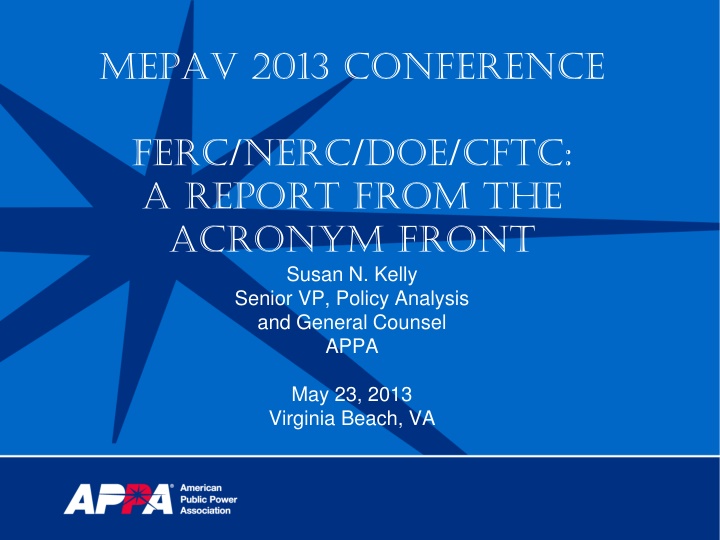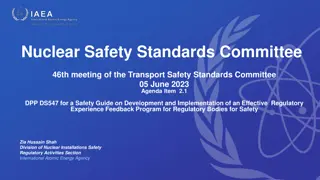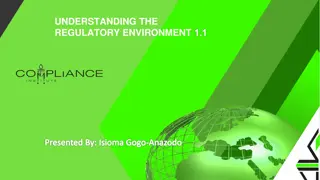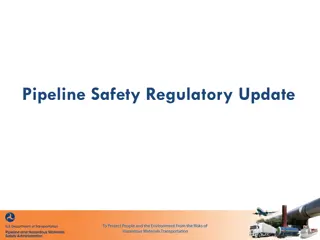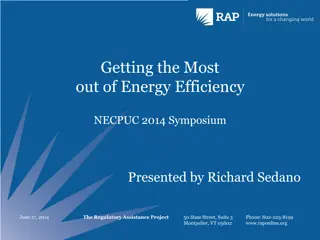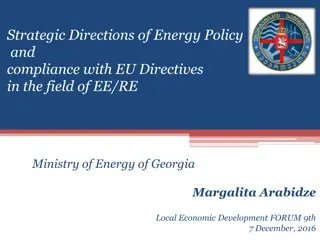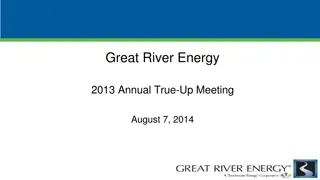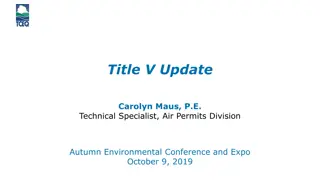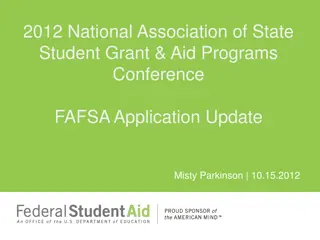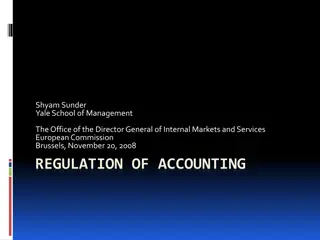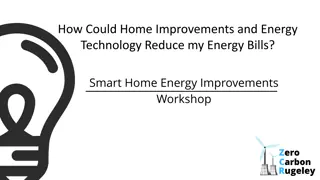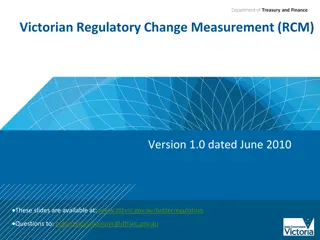Energy Regulatory Conference Highlights and Updates 2013
The MEPAV 2013 Conference report discusses key issues like demand response, renewable generation, and transmission planning at FERC. Updates on FERC commissioners, new DOE appointees, and challenges like Court Appeals of Order No. 1000 are included, shedding light on important regulatory matters in the energy sector.
Download Presentation

Please find below an Image/Link to download the presentation.
The content on the website is provided AS IS for your information and personal use only. It may not be sold, licensed, or shared on other websites without obtaining consent from the author.If you encounter any issues during the download, it is possible that the publisher has removed the file from their server.
You are allowed to download the files provided on this website for personal or commercial use, subject to the condition that they are used lawfully. All files are the property of their respective owners.
The content on the website is provided AS IS for your information and personal use only. It may not be sold, licensed, or shared on other websites without obtaining consent from the author.
E N D
Presentation Transcript
MEPAV 2013 CONFERENCE FERC/NERC/DOE/CFTC: A report from the acronym front Susan N. Kelly Senior VP, Policy Analysis and General Counsel APPA May 23, 2013 Virginia Beach, VA
The Current FERC Line Up Chairman Jon Wellinghoff (D): His Big Three issues are: Demand Response, Renewable Generation, and Transmission Other Commissioners: Phil Moeller (R), John Norris (D), Cheryl LaFleur (D), Tony Clark (R) Chairman s term expires 6/30/13; he can hold over until Congress adjourns
Extra Bonus Appointees New DOE Secretary just (finally) confirmed: Ernest Moniz From MIT, but worked at DOE before in the Clinton Administration, and seems open to different energy sources (e.g., nuclear) Nominated EPA Administrator (Gina McCarthy) still subject to Senate hold by Sen. Blunt, but will likely be confirmed in the end APPA has worked with her
Transmission Planning and Cost Allocation FERC long interested in transmission (TX) planning but now with a renewables slant Issued Order No. 1000 in RM10-23 in July 2011 to ensure that: Regional (and interregional) TX planning processes consider and evaluate transmission alternatives to produce efficient and cost-effective plans The costs of TX solutions chosen to meet regional (and interregional) needs are allocated fairly to those who receive benefits from them
Court Appeals of Order No. 1000 Appeals consolidated in D.C. Circuit and initial briefs due 5/28; issues include: FERC s failure to implement FPA Section 217(b)(4) (APPA s biggest issue) Elimination of Rights of First Refusal (ROFR) Allocation of TX costs in absence of a contract Scope of reciprocity requirement FERC s failure to invoke FPA Section 211A (requiring non-jurisdictional utilities to participate)
FPA Section 217(b)(4) Why Is It Important? It requires FERC to support load-serving entities (LSEs) transmission needs: The Commission shall exercise the authority of the Commission under this Act in a manner that facilitates the planning and expansion of transmission facilities to meet the reasonable needs of load-serving entities to satisfy the service obligations of the load-serving entities
Compliance Deadlines Most TX Provider (TP) compliance filings to revise their Open Access Transmission Tariffs (OATTs) to add regional TX planning/cost allocation provisions have now been made Deadline for compliance filings re the interregional transmission planning coordination and cost allocation requirements has just been extended to 7/10/13 due to multiple requests for extensions
Order No. 1000 Compliance Will Be Job 1 At FERC This Year . Commissioner Moeller speaking at FERC s 2/21/13 Open Meeting: I'll quickly note, also, today, even though we're not going to discuss it, we are commencing our Order No. 1000 compliance filings, or orders on those compliance filings. And this will probably be a multi-year undertaking that this agency endures. It is probably the biggest human resources project that the agency has ever done, and I trust and hope that the public and the people we regulate will follow it very closely.
A Sample of The Many Compliance Orders... 2/21/13 Duke Carolinas Order (ER13-83) Merged Duke and Progress systems in NC are NOT big enough to be a compliant Order No. 1000 TX planning region (and addition of another small TP not enough either) Duke has sought rehearing of this ruling
PJM Order 1000 Compliance Order (ER13-198, 3/22/13) Order is over 200 single spaced pages! FERC found that PJM had largely complied with Order 1000, but had not done enough to eliminate federal ROFR from tariff; Moeller and Clark dissented on this point; Clark also dissented on FERC s failure to acknowledge state ROFRs in TX planning NARUC has intervened out of time to seek rehearing on this last issue
Westconnect Order 1000 Order (ER13-75, 3/22/13) Westconnect is a non-RTO TX planning region with both jurisdictional and non- jurisdictional TO utility members FERC put non-jurisdictional TOs on the spot; they cannot be full participants in TX planning unless they sign up IN ADVANCE for TX cost allocation; they have sought rehearing
Open Access Requirements for Generator Interconnection TX On 4/19/12 FERC issued Notice of Inquiry (NOI) in AD12-14 re open access policies on generator interconnection facilities FERC asked whether open access should apply or whether it should modify its policies to provide a safe harbor that would allow the generator priority access
APPA Comments APPA attempted in its 6/26/12 comments to balance the interests of first movers and later comers Open access should apply to TX facilities Streamlined Open Access Transmission Tariff (OATT) would be appropriate No OATT filing required until later coming customer shows it is serious (deposit)
Merchant Transmission Issues FERC issued proposed policy statement re rules for allocating capacity on merchant TX projects in AD12-9; issues included: Role of open seasons (should there be any?) Preference to be given to anchor customers Should it be permissible to discriminate among bidders based on credit risk, term of service, price bid? Is it OK to award 100% of capacity (to affiliates)?
APPA Merchant TX Comments APPA filed comments on 9/24/12: Replacement of an open season requirement with open solicitation and post hoc reporting requirement unlikely to work in practice Detailed reporting of negotiations with prospective customers would likely raise confidentiality concerns (and they did!) Desire to support merchant TX should not come at expense of FPA protections
1/17/13 Policy Statement on Merchant TX Commission will allow developers of merchant TX to select a subset of customers, based on not unduly discriminatory or preferential criteria Can negotiate directly with customers the key rates, terms, and conditions for up to the full amount of transmission capacity (including affiliates) Developers must (1) broadly solicit interest in the project, and (2) demonstrate that the developer has satisfied the relevant customer solicitation, selection and negotiation process criteria (after it is done!)
Established TX Access Policies Are Under the Microscope FERC questioning long-established open access policies intended to prevent discrimination, such as open access requirements, open seasons, standard rate schedules and rates Do these requirements really stand in the way of needed transmission facilities? (Who needs them? For what purpose?)
NOI on Transmission Rate Incentives FERC issued a Notice of Inquiry (NOI) in May 2011 in RM11-26 (after major lobbying effort) FERC asked many questions about its current TX incentives policy, under which many thought FERC was granting overly generous incentives APPA helped form broad customer-side coalition to file joint comments in August 2011; it included public power, state PUCs, state consumer advocates, industrials, co-ops
Policy Statement on Transmission Rate Incentives On 11/15/12, FERC issued Policy Statement on transmission rate incentives, announcing revisions to its current policy Applicants must take reasonable steps to mitigate risks of a project (one way is to pursue joint ownership arrangements) Risk reducing incentives should be considered first, and will be taken into account in ROE awards (should reduce ROE incentives?)
Wholesale Demand Response (RM10-17) FERC issued Order No. 745 re wholesale demand response (DR) in RM10-17, requiring Regional Transmission Organizations (RTOs) to pay wholesale demand responders the locational marginal price set by the market ( full LMP ), subject only to a net benefits test
APPAs Wholesale DR Issues Is FERC s exercise of jurisdiction over wholesale DR supported by the statute? Is it a sale of electric energy at wholesale, or transmission of electric energy in interstate commerce (we say no) or is it a practice or contract affecting a rate (FERC says yes)? Is full LMP an unjust/unreasonable rate? We say yes utilities left standing at the altar
Appeal of Order No. 745 Appeals consolidated in U.S. Court of Appeals for the D.C. Circuit; briefing now completed; decision later this year? Talk about your strange bedfellows! EPSA, APPA, NRECA, EEI, ODEC and 21 Economists (including Prof. Hogan!) v. FERC, Industrial Customers, Environmental Groups, DR Providers, IL CUB, Walmart
RTO Locational Capacity Markets Mandatory annual auctions for capacity to be supplied a few years in the future; pricing is based on the location of the generation (if in constrained zone, will have higher capacity prices) Markets generally have a Minimum Offer Price Rule (MOPR) designed to avoid exercise of buyer-side market power (meaning the auction price is TOO LOW)
PJMs Capacity Market PJM s capacity market is called the Reliability Pricing Model (RPM) Implemented as result of a 2006 settlement Load Serving Entities (LSEs) got a self supply MOPR exception that enabled them to go along their generation resources would automatically clear the market, so they would not have to pay twice for capacity (once under bilateral contract and again from the market)
FERCs Minimum Offer Price Rule (MOPR) Orders FERC in an April 2011 order in ER11- 2875 amended PJM s RPM rules to effectively eliminate the state and LSE self supply exceptions from the MOPR to prevent the exercise of buyer-side market power ; these rule revisions can adversely impact public power systems trying to build new gas-fired generation
MOPR Rehearing/Appeal FERC denied rehearing even though self- supply provisions had been specifically bargained for in a settlement; relied on a case-by-case exception process as an out for self-supplying LSEs MD/NJ and APPA/NRECA/their PJM members are seeking review in 3rdCircuit; briefs filed; oral argument in September
PJM MOPR Redo? But generators in PJM (G7) were unhappy with MOPR provisions still too many loopholes for states, so they negotiated revised MOPR provisions with self-supplying LSEs (IOU, co-ops, public power), industrials PJM filed proposal with FERC on 12/7/12 in ER13-575; the states strongly opposed it FERC issued a 2/5/13 deficiency letter ; PJM responded; yet more protests filed
FERCs May 2 Order FERC issued 5/2 Order largely accepting PJM s filing, including self supply provisions LSEs had negotiated with G7 But FERC did NOT eliminate the unit specific exception that the states (MD and NJ) supported and G7 strongly opposed G7 will likely seek rehearing; ultimate fate of this most recent deal is still unclear ..
Gas-Electric Coordination Commission held a series of 5 technical conferences in AD12-12 in summer 2012 to discuss the gas-electric coordination issue. Recurring themes: Need for improved communications between the two industries Alignment of gas and electric days and increased intra-day flexibility Construction of new or increased pipeline capacity
More Gas-Electric Coordination FERC holding two technical conferences in 2013: One on improving communications between the natural gas and electric power industries Second on harmonizing gas and electric power scheduling, including gas and electric days RTOs to report to FERC during 2013 on their experiences during the winter, spring, summer and fall seasons FERC Staff to report to FERC on the natural gas and electric industries coordination activities at least once each quarter for 2013 and 2014
FERC, NERC and Reliability The North American Electric Reliability Corporation (NERC) is the FERC-designated Electric Reliability Organization (ERO) under FPA Section 215 that develops and enforces reliability standards, subject to FERC oversight Users, owners and operators of the bulk power system must comply with standards that includes about 330 APPA Members, who are on NERC s Compliance Registry
Definition of the Bulk Electric System FERC issued Final Rule in December 2012 that largely adopts NERC s proposed BES definition (100 kV bright line with inclusions/exclusions/exception process) FERC modified two exceptions that could adversely impact utilities with radials connected (looped) at less than 100 kV; APPA/NRECA/TAPS filed 1/13 rehearings; now working on extension with NERC
Find, Fix, Track and Report NERC Compliance Enforcement Initiative Lesser risk issues that are fixed-in-the-field by the registered entity are reported to FERC in an FFTR spreadsheet not processed as violations FERC approved in March, directed further work; NERC filed report in March 2013 NERC s CEO would like to change approach to standards and compliance to emphasize internal controls over getting files in order can it?
Cybersecurity Standards FERC approved NERC s CIP Version 4 bright line criteria to go into effect 4/1/14 NERC filed CIP Version 5 with FERC: covers 3 classes of assets (low, medium and high); LSEs excluded, DPs in if specified protection systems FERC issued 4/13 NOPR with many questions, but seems open to transition straight from 3 to 5 .
CybersecurityIt Just Gets Bigger Every Day White House Cybersecurity Maturity Model (APPA assisted with developing) Information sharing re threats through NERC ES-ISAC ALL utilities should sign up for the portal! 2/13 White House Executive Order on Cybersecurity increased information sharing and NIST-developed Cybersecurity Framework
An Alphabet Soup of Agencies Presidential Policy Directive (PPD-21) issued 2/12/13 lays out respective roles of DHS, State, DOJ/FBI, Interior, Commerce, etc. in dealing with cybersecurity Sector Specific Agency (SSA) for the energy sector is DOE (not FERC) FERC interested in a bigger role
NIST Framework National Institute of Standards and Technology (NIST) has been directed to develop a cybersecurity framework for critical infrastructure; initial comments were due to NIST on 4/8/13; APPA filed Our goal: avoid conflicts between NERC CIP and any NIST standards; give us credit for what we have done already
And Congress Will Weigh In Bills are already in process, e.g., HR 624, the Cyber Intelligence Sharing and Protection Act (Rep. Rogers, R-MI) Two different philosophies: voluntary cooperation and information sharing (CISPA) v. new standards for critical infrastructure of all stripes (including us) from DHS or maybe NIST?
And the Cherry on Top: The GMD Final Rule GMD=Geomagnetic Disturbances (e.g., sunspot induced GM storms) 5/16/ 13 FERC Final Rule requires NERC/industry to develop standards: 6 Mos: operational procedures to mitigate GMDs 18 Mos: assess possible impacts and develop plans to protect against benchmark events
Oh Yes, the Commodity Futures Trading Commission Finally appear to be wrapping up most Dodd-Frank Rulemakings: Proposed exemptive order for 201(f) entities (us, co-ops, federal utilities); looks good Proposed exemptive order for RTO products and services; not as good keeping strings Annual $25 million limit on swap transactions with special entities not good at all 10/12/12 no action relief very incomplete
H.R. 1038, The Public Power Risk Management Act Surgical fix to allow public power utilities to enter into energy-related swaps under same rules as other electric utilities Passed House Agriculture Committee on 3/20; hopefully headed to the floor Working on the Senate side now; possible issue is Democratic-side unhappiness with CFTC s swap dealer definition
CFTC and FERC: A Hate-Hate Relationship? Ongoing jurisdictional dispute re market manipulation authorities between CFTC and FERC which FERC lost in the DC Circuit in March in Hunter case . Section 720 of DFA required 2 MOUs by 2011 between the agencies; both are MIA Sens Feinstein, Murkowski and Wyden sent 4/29/13 letter: turn in the homework!
Public Powers Task We need to ensure that cost increases to consumers are justified, and not the result of ideology rather than fact-based policy making We need to support needed new infrastructure to comply with new regulations and ensure reliability on a rational timetable We need rational reliability standards that balance costs and benefits, and an enforcement regime that emphasizes a culture of compliance over papers please !
We Must Hang Together Public power systems must hang together (or hang separately) in an increasingly complex environment State organizations like MEPAV are vital links in the public power community National advocacy organizations like APPA provide a voice in DC and technical expertise
Questions???? Susan N. Kelly skelly@publicpower.org 202-467-2933
